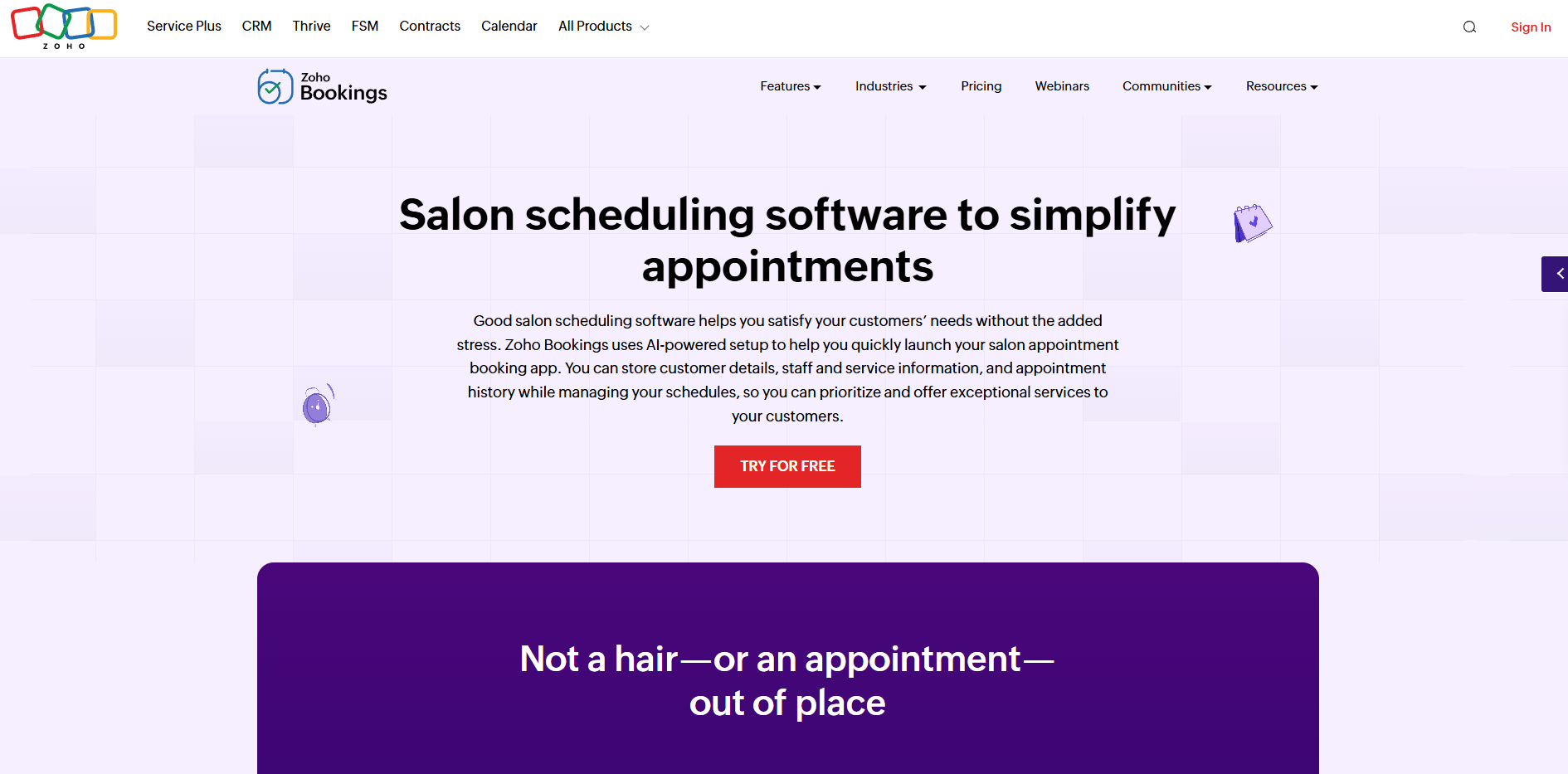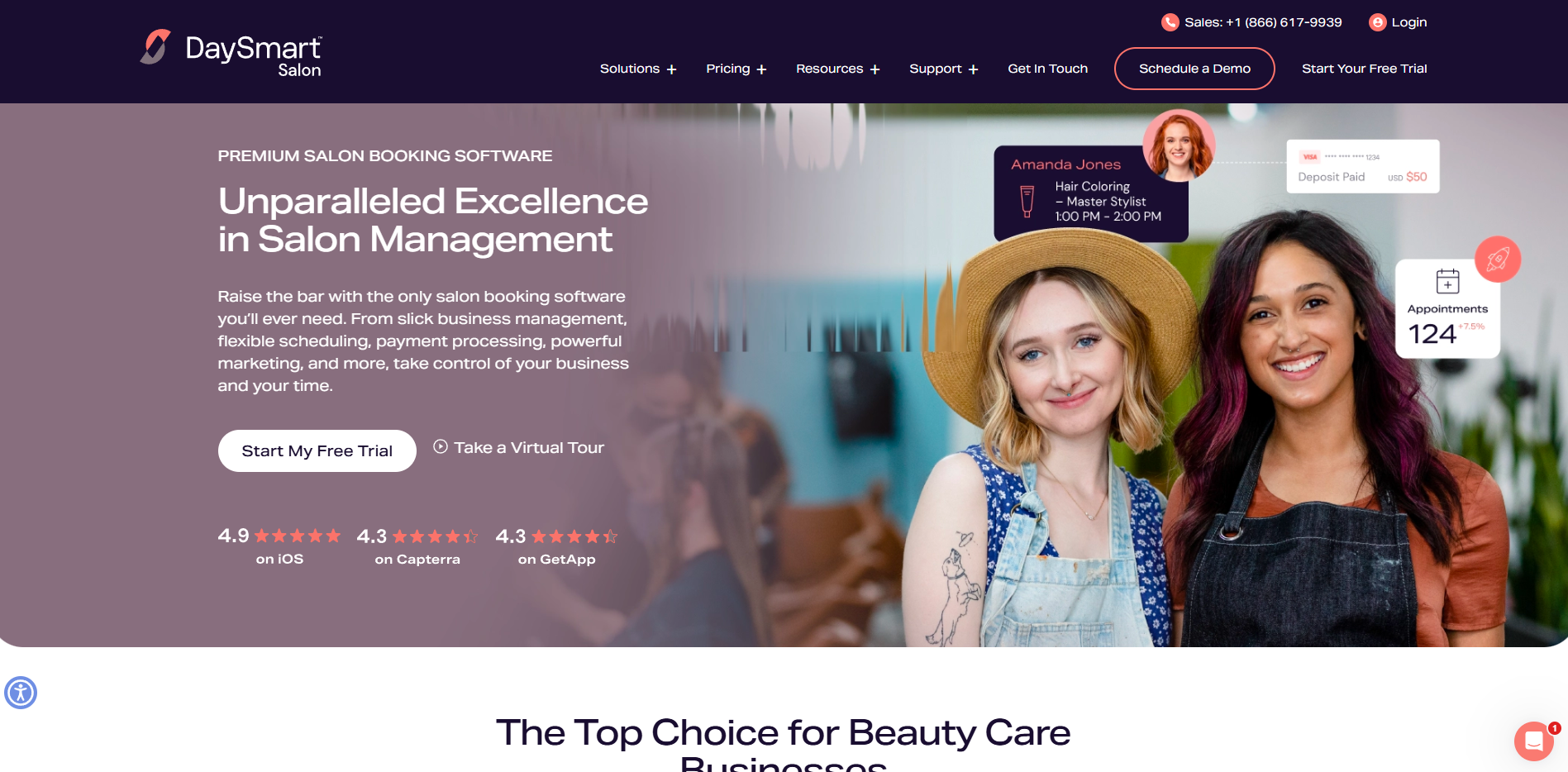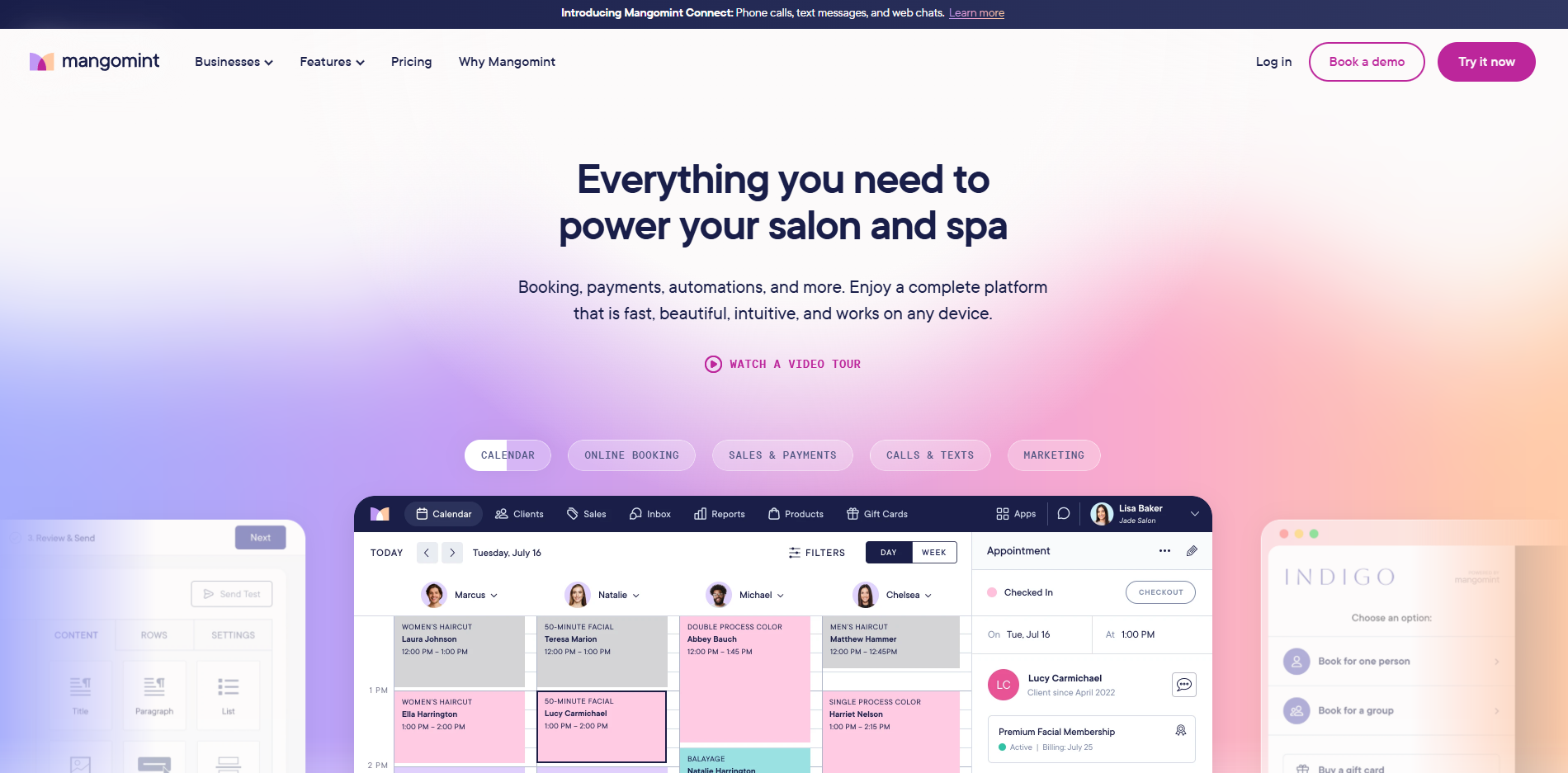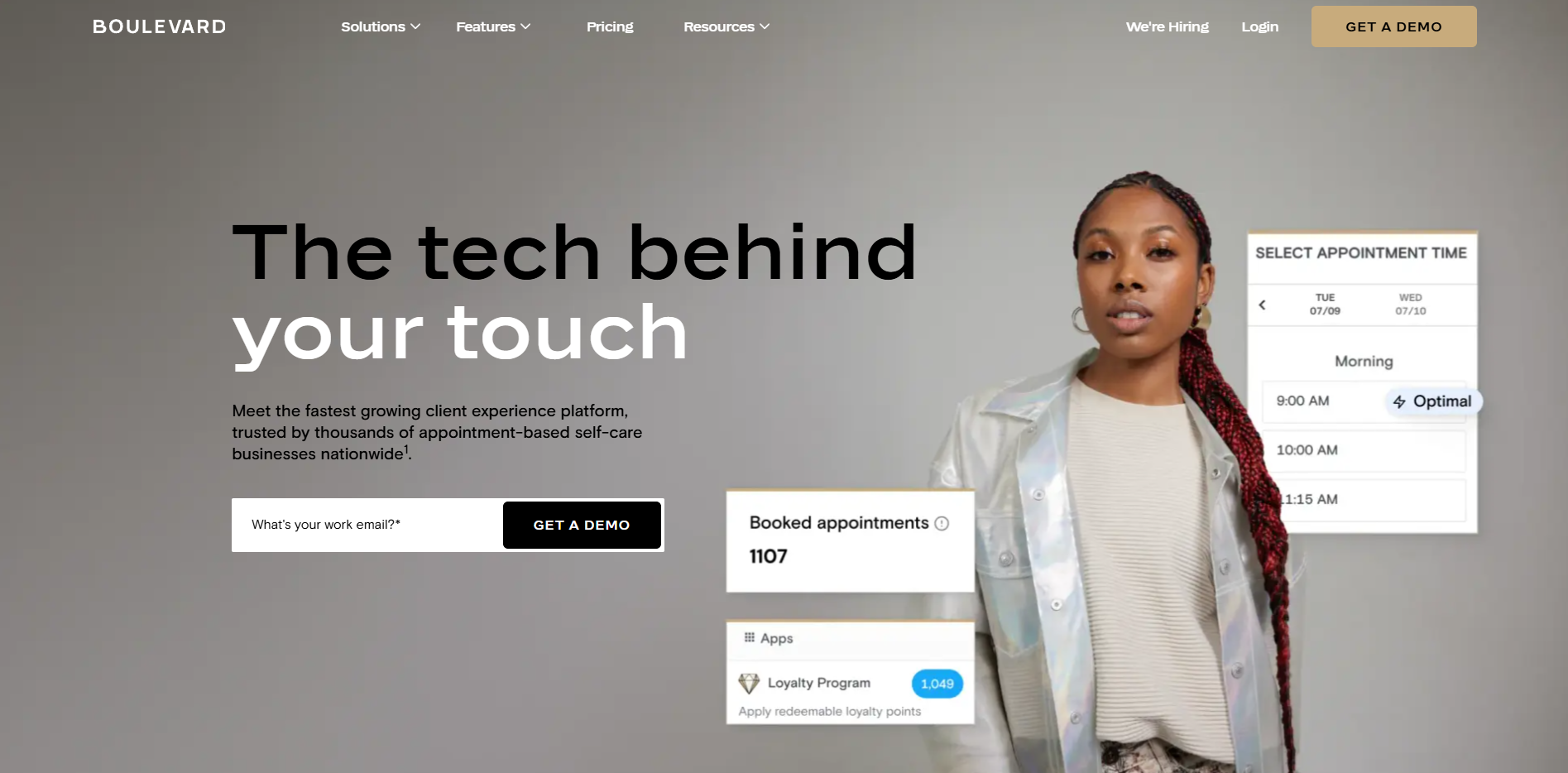Running a salon is far more complicated than you might think. Scheduling clients efficiently and managing your retail inventory are just the tip of the iceberg — you’re also handling marketing, running reports, and so much more. Hair salon management software can make the whole ordeal much simpler, but choosing the right one is easier said than done, and the best choice for one salon may not be the ideal option for another.
That’s why I’m doing a deep dive into the best hair salon management software on the market, taking into account factors like price, ease of use, and must-have features. I’ve picked my favorite solutions for each stage of growth, so whether you’re an independent stylist just starting out or a large-scale salon, you’ll find something here for you.
Best for Independent Stylists: Zoho Bookings”

I like Zoho Bookings because it’s a great starter option, whether you’re new to booth renting or owning a single-chair salon. It’s definitely usable by salons with multiple stylists or even multiple locations, but it especially shines in solo use.
It comes with all the standard features you’d expect from any modern hair salon software: you can set specific working hours and even booking limits to minimize the chance of stylist overload, and each customer gets their own profile to track notes, past appointments, and previous purchases.
But here’s why I like it for solo stylists: It can integrate with your SMS messages, WhatsApp, calendar apps, and even Google Analytics. These integrations are a lifesaver and are where Zoho excels — but integrating all of that for several stylists at once can get a little messy. For example, every user on your Zoho account is charged to the same credit card. If you and the other stylists are all booth renting, who gets the main ownership of the account?
That’s just one reason why I think it’s best used by individual stylists.
The price is very affordable for what you get: $6/month covers booking functionality for one user or stylist. For $9/month, you get online payment integrations, revenue reports, and the ability to tie your online booking to your own website domain.
Pros
- Simple, straightforward user interface
- Available on desktop and mobile
- Very affordable compared to other options
- Optional marketing features to grow your business when you’re ready
Cons
- Basic tier doesn’t include payment processing
- Customer support can be lackluster
- The appointment booking page has fairly limited customization options
- The desktop app has features that haven’t been added to the mobile app
Who Should Use Zoho
Zoho Bookings is ideal for newer independent stylists who need basic appointment-booking and payment functionalities. Besides the useful integrations that don’t scale well, the super-simple UI is free of the more complex bells and whistles that you likely don’t need yet.
And with $6/month and $9/month options, it won’t eat into your revenue the way more complex options might.
Best for Indies and Small Salons: DaySmart Salon

DaySmart Salon touts customization as its standout feature. Whether you’re an independent stylist or you have a small team, its features can be dialed in based on your needs. It includes functionality for online booking, client waivers, automated confirmations and reminders, built-in two-way texting with clients, payment processing, and more. Yet despite all those options, the user interface is still super clean, simple, and uncluttered.
In my and most users’ experience, customer service can go either way. Some days, you get incredibly prompt and helpful service; some days, the wait can be agonizingly long. DaySmart has recently introduced more live support options to minimize these concerns, however, which is great to see.
While Zoho might be better for indies, DaySmart’s Basic tier is still a solid choice. At $29/month, you get 1 user, email, chat, and phone support, online booking, Instagram and Facebook booking, reporting, and payment processing. No gift cards, but basically everything else you need as a solo stylist.
Small salons with multiple stylists will want to go for its Deluxe and Premium tiers ($69/month and $199/month, respectively). The Deluxe tier supports up to 3 users and features like a loyalty program, gift cards, and a productivity dashboard. The Premium tier supports 6 users, QuickBooks connections, marketing tools, and other features.
Pros
- Easy to use, even if you don’t consider yourself to be tech-savvy
- Extremely customizable to your specific preferences and workflows
- Simple, intuitive booking feature
Cons
- Certain functionalities can be slightly glitchy at times
- Customer service can be a bit inconsistent or hard to reach
- Mobile app isn’t as easy to use as the desktop browser version
- Setup can be a bit time-consuming, such as inputting each stylist’s offered services
Who Should Use DaySmart Salon
DaySmart Salon is best for independent stylists and small businesses who know exactly what features they do and don’t need to run their salons. With marketing integrations to maximize profits, I like this one for small businesses specifically.
Best Middle Ground: Mangomint

Mangomint is one of the better-known names in hair salon software — and for good reason. For one, their customer service is renowned for not just being responsive but genuinely helpful. The software itself is also thoughtfully designed: the interface is very sophisticated and has functionality for everything you’d hope to see, like online booking, point of sale, inventory, revenue reporting, and so much more. It also integrates with quite a few modern apps and systems, which makes it one of the more flexible software options available.
However, you certainly don’t have to plug in a bunch of different apps in order to get it to work well. Mangomint includes a broad range of features right out of the gate, like no-show protection, gift card integration, and more.
In terms of pricing, Mangomint is a bit of a step up from other software. The Essentials tier for small teams (up to 10 service providers) is $165/month, and it doesn’t include every single feature.
Its Standard tier is $245/month and allows up to 20 service providers, unlocking not just standard integrations but features like memberships and express bookings to streamline day-to-day processes.
For large businesses and unlimited service providers, there’s the Unlimited tier at $375/month. This gives you access to every single advanced feature, plus built-in integrations like Shopify. Custom APIs are also available in this tier, which you could use to do things like set up an AI-powered receptionist.
Pros
- Streamlined, user-friendly layout
- Customer support is often praised for being responsive and helpful
- Clients find it very easy to book online and check in for appointments
- Includes tools for tracking shifts, managing staff schedules, and maintaining retail inventory
Cons
- The scheduling system can be tricky for teams with diverse needs
- Paying for extra features and integrations can add up fast
- Not particularly affordable for most smaller businesses
- Customization options are somewhat limited
Who Should Use Mangomint
Mangomint can be a great choice for small- to medium-sized businesses (though it’s probably best for the latter), whether you’re looking to grow or maintain your current sales volume. It’s specifically designed for teams, so solo and independent stylists should pass on this one.
Best for Larger Salons: Aura

Aura Salonware launched back in 2018 and recently combined with Rosy Salon Software to create the ultimate enterprise solution for large-scale salons.
This one’s a bit unique thanks to its almost overwhelming focus on tech-forward, data-driven design. For example, Aura offers not just the usual inventory management and reporting tools, but also an entire KPI dashboard that’s customizable for each individual user.
Understandably so, users may feel a little intimidated upon first logging in. The appointment calendar is thankfully very straightforward, but other features like inventory management and its double-booking tool can be a bit complex at first glance. It’s the only option on this list that you’ll need to devote some serious time to learning.
No matter which plan you choose, you get unlimited seats. However, many of its most useful features (like two-way texting with clients) are gated behind more expensive tiers.
The Fearless tier is $199/month and comes with get booking, staff management, reporting, and marketing tools. The Fierce tier is $349/month and includes two-way texting and client forms/waivers. The top tier, Ferocious, will run you $429/month and also lets you offer both classes and pre-paid memberships.
There are also mix-and-match add-ons if any one plan isn’t exactly what you need, which is incredibly valuable.
Pros
- Vast amount of data and functionality, including a customizable KPI dashboard
- Customer support tends to be highly responsive, helpful, and effective
- Built-in payment options that can securely store credit cards and charge no-shows
- If you have a lot of users, the lower tiers may be a huge savings versus your current software
Cons
- Can feel unapproachable to many users
- Lowest tier is expensive for smaller salons that only need a few users
- Most must-have features aren’t included in the lowest tier
- Required to sign a one-year contract to get started
Who Should Use Aura
Aura is really best for large-sized salons that know how to get the most out of their data and aren’t afraid of a complex user interface. If you’ve found yourself wanting to simplify inventory restocks, pull up a staff member’s performance overview with just a few clicks, or elevate client engagement, Aura offers the tools you need.
Best for All-Around Growth: Boulevard

Boulevard is a newer name among hair salon management software options, but it’s already picking up traction as an all-purpose solution that’s tailored toward growing salons.
Besides booking, Boulevard also handles inventory tracking, payroll, client communication, and point of sale. It even has QuickBooks integrations and tools that protect you from no-shows. So instead of needing to install add-ons or pay for additional tools, everything exists natively in Boulevard.
As a salon owner myself, having everything in one place is a true game-changer. Neither I nor my staff have to constantly remember various log-ins or waste valuable time bouncing between different apps and dashboards.
Pricing here is on the higher end, but you can opt to pay à la carte fees rather than upgrading before you’re quite ready.
The Essentials tier will run you $176/month per location, but it doesn’t include functionalities like Google Analytics, promo codes, or a loyalty program. The Premier tier is $293/month per location and includes features like group bookings, shared memberships, and 1,000 email blasts per month. The Prestige tier is $410 per month and includes helpful features like forms/charts, 10,000 marketing email blasts per month, and 2,500 two-way SMS messages per month (compared to Essentials’ 100 and Premier’s 250).
You can also inquire about Boulevard’s bespoke Enterprise plan, which is designed for large, complex operations.
Pros
- Very intuitive and easy to use, even for new users
- Customer support is very responsive
- Precision Scheduling™ automatically fills gaps in your calendar to maximize productivity
Cons
- You can book a free demo to see everything, but there’s no option for a free trial
- Certain features are only available at a higher price tier, not à la carte
Who Should Use Boulevard
Boulevard is an all-around great pick for growth-minded businesses that know which features they need and don’t want to juggle multiple software options. However, it’s not the best fit for solo stylists, and if you have fewer than 5 service providers at your salon, you likely won’t get the maximum value this platform has to offer.
So What’s the Best Hair Salon Management Software?
Deciding on the best hair salon management software for your needs will come down to your business model. Independent stylists should probably stick with Zoho, while the smallest salons can’t go wrong with DaySmart. However, for most use cases, I’m a big fan of Boulevard’s comprehensive software — you can’t go wrong with it.
- Best Personalized Hair Growth Products - January 23, 2026
- Happy Head vs Strut - January 22, 2026
- The Best Shampoo for Shedding Hair, According to a Licensed Cosmetologist - January 14, 2026

